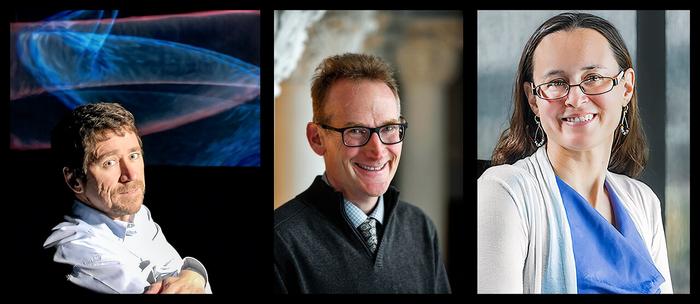The Shaw Prize in Astronomy 2023 is awarded in equal shares to Matthew Bailes, Director of the Australian Research Council (ARC) Centre of Excellence for Gravitational Wave Discovery, Duncan Lorimer, Professor and Interim Chair of Physics and Astronomy and Associate Dean for Research at Eberly College of Arts and Sciences at West Virginia University, USA and Maura McLaughlin, Eberly Family Distinguished Professor at the Department of Physics and Astronomy, West Virginia University, USA, for the discovery of fast radio bursts (FRBs).

Credit: Shaw Prize
The Shaw Prize in Astronomy 2023 is awarded in equal shares to Matthew Bailes, Director of the Australian Research Council (ARC) Centre of Excellence for Gravitational Wave Discovery, Duncan Lorimer, Professor and Interim Chair of Physics and Astronomy and Associate Dean for Research at Eberly College of Arts and Sciences at West Virginia University, USA and Maura McLaughlin, Eberly Family Distinguished Professor at the Department of Physics and Astronomy, West Virginia University, USA, for the discovery of fast radio bursts (FRBs).
Fast radio bursts (FRBs) are among the most extreme and mysterious phenomena in astronomy; they are intense bursts of radio emission lasting only a few thousandths of a second that release as much energy as the Sun emits over several days. The sources of the bursts are smaller than the Earth but are as far away as distant galaxies. In a seminal research paper written in 2007, Bailes, Lorimer and McLaughlin (with collaborators Narkevic and Crawford) found the first FRB, deduced many of the properties of its source, in particular its extreme distance, small size, and enormous energy, estimated the cosmic rate of production of FRBs, and highlighted their potential as cosmological probes.
Despite initial scepticism about whether this unique event was a real astronomical source, the work by Bailes, Lorimer and McLaughlin inspired others to search for these elusive events. By now almost a thousand FRBs have been discovered. Telescopes based on novel technologies are being designed and built specifically to find FRBs and identify their host galaxies.
Although the nature of FRBs remains unknown, they are almost certainly associated with neutron stars, collapsed stellar remnants that contain the mass of the Sun within a diameter of only a few tens of kilometres. FRBs have the potential to provide a unique probe of physics in extreme conditions and of the distribution of matter in the Universe.
Matthew Bailes is on the faculty of Swinburne University of Technology in Melbourne, Australia. Duncan Lorimer and Maura McLaughlin are on the faculty at West Virginia University in Morgantown, West Virginia, USA. This award is also intended to recognise the other collaborators in this research, and the investigators who collected the original data for other purposes.
More information
The IAU is the international astronomical organisation that brings together more than 12 000 active professional astronomers from more than 100 countries worldwide. Its mission is to promote and safeguard astronomy in all its aspects, including research, communication, education and development, through international cooperation. The IAU also serves as the internationally recognised authority for assigning designations to celestial bodies and the surface features on them. Founded in 1919, the IAU is the world’s largest professional body for astronomers.
Links
* The Shaw Prize – https://www.shawprize.org/
Contacts
Peggy Ng
Shaw Prize
Email: [email protected]
Lars Lindberg Christensen
IAU Director of Communications
Tel: +1 520 461 0433
Cell: +49 173 38 72 621
Email: [email protected]




